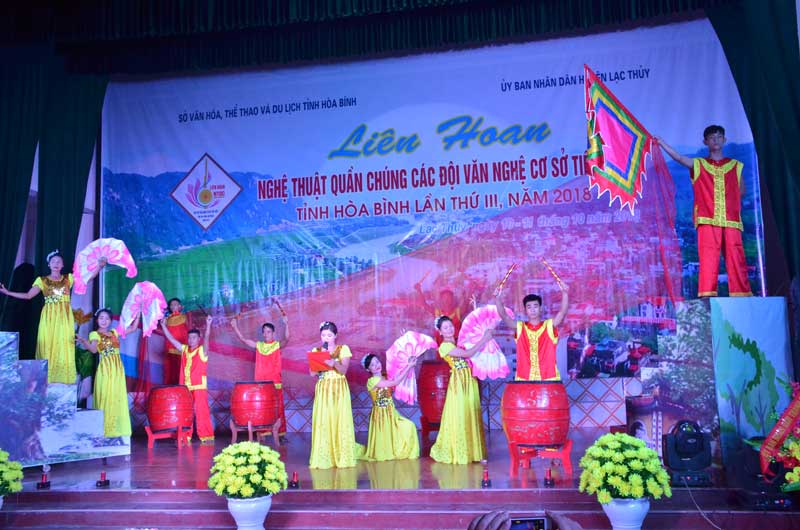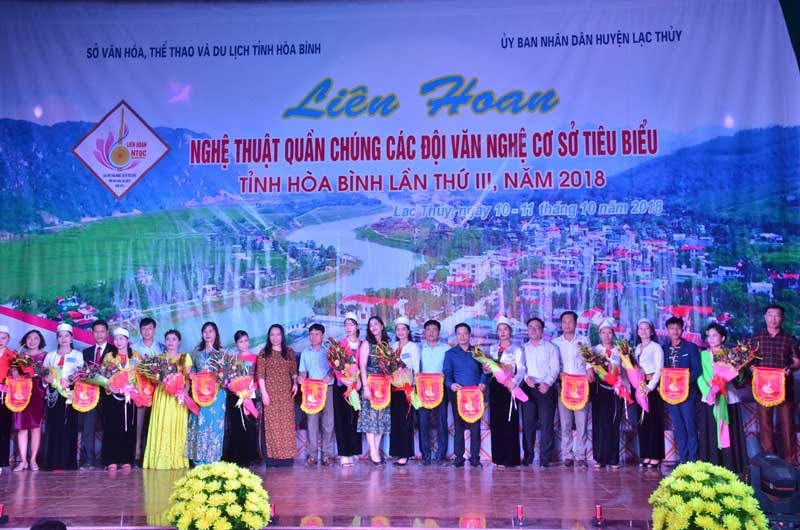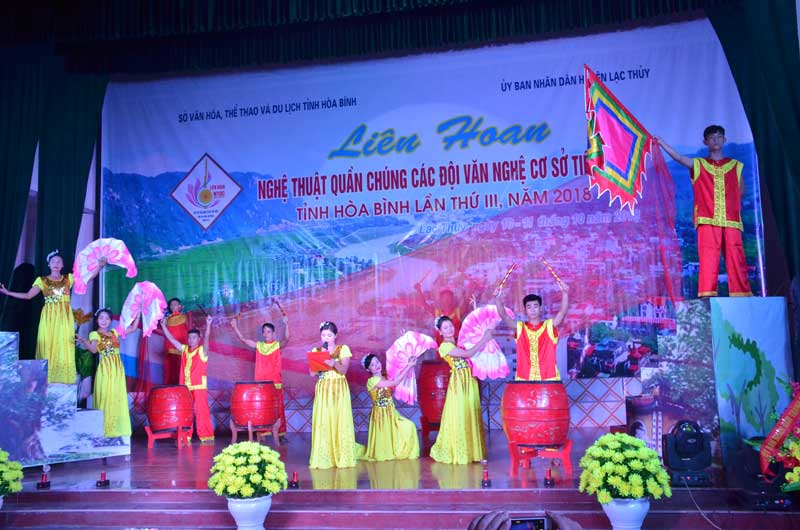
(HBO) – The Department of Culture, Sports and Tourism of Hoa Binh recently held the 2018 art festival for the province’s outstanding grassroots-level art troupes, in Lac Thuy district.

Organisers
present memorial flags to participating troupes.

Performance
of the art troupe in Vai hamlet, Thanh Nong commune (Lac Thuy district)
Nearly 300 artists, actors and actresses from 11 outstanding grassroots-level
art teams in 11 districts and cities participated in the festival. They
represented more than 2,000 art troupes in all villages, hamlets and
residential clusters in Hoa Binh province.
During the two-day event, the art troupes staged nearly 40
performances praising patriotism, the Communist Party of Vietnam and President
Ho Chi Minh, and the national target programme on building new-style rural
areas.
According to organisers, the performances this year were of better
quality compared to the previous edition, as the teams had thoroughly prepared
content, costumes, and props. Each programme was built on a consistent theme
which is close to people’s lives.
Notably, most of the troupes used folk melodies, dances and
traditional music instruments in their performances, thus creating a colourful
art festival which aimed to honour, preserve and develop traditional cultural
values.
At the end of the festival, organisers presented four first prizes,
eight second, and 12 third prizes, along with 12 consolation prizes in singing
and dancing categories.
In general, the first prize was granted to the art troupe from Vai
hamlet, Thanh Nong commune (Lac Thuy district).
Those from Moi Mit hamlet of Yen Mong commune (Hoa Binh city) and
Du 7A hamlet of Mong Hoa commune (Ky Son district) received second prizes.
The third prizes were given to troupes from Van hamlet, Mai Chau
town (Mai Chau district), Lien Tien hamlet in Ngoc Luong commune (Yen Thuy
district), and Ma hamlet, Bac Phong commune (Cao Phong district) while five
consolation prizes were presented to the remaining teams./.
With an increasingly vibrant and widespread emulation movement aimed at building cultured residential areas and cultured families, Yen Thuy District has been making steady progress toward improving both the material and spiritual well-being of its people, while fostering a civilized, prosperous, beautiful, and progressive community.
Once lacking recreational spaces and community facilities, Residential Group 2 in Quynh Lam Ward (Hoa Binh City) has recently received attention for the construction of a new, spacious, and fully equipped cultural house. The project followed the model of state support combined with public contributions in both labor and funding.
The "All people unite to build cultural life" movement, which has been effectively integrated with Kim Boi district’s socio-economic development goals, is fostering a lively spirit of emulation across local residential areas, hamlets, villages, public agencies, and enterprises. In addition, through the initiative, traditional cultural values are being preserved and promoted, while community solidarity and mutual support in poverty reduction and economic development are being strengthened.
A working delegation of the Hoa Binh provincial People’s Committee led by its Permanent Vice Chairman Nguyen Van Toan on June 11 inspected the progress of a project to build the Mo Muong Cultural Heritage Conservation Space linked to tourism services in Hop Phong commune, Cao Phong district.
Born and growing in the heroic land of Muong Dong, Dinh Thi Kieu Dung, a resident in Bo town of Kim Boi district, in her childhood was nurtured by the sweet lullabies of her grandmother and mother. These melodies deeply imprinted on her soul, becoming an inseparable part of her love for her ethnic group's culture. For over 20 years, this love for her hometown has driven Dung to research, collect, and pass down the cultural values of the Muong people to future generations.
In the final days of May, the Ethnic Art Troupe of Hoa Binh Province organized performances to serve the people in remote, mountainous, and particularly disadvantaged areas within the province. These were not just ordinary artistic shows, but they were the meaningful journeys aimed at spreading cultural values, enhancing the spiritual life of the people and contributing to the preservation of ethnic minority cultural identities.




